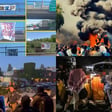
An Interview with International Solidarity Movement Volunteers
In this conversation, we speak with two recent International Solidarity Movement (ISM) volunteers about their experiences accompanying Palestinians in the West Bank. International Solidarity Movement is an initiative based in Palestine that enables international volunteers to physically accompany Palestinians facing harassment and attacks from the Israeli occupation. We discuss what everyday resistance — both large and small — looks like for Palestinians in the West Bank. Among many other topics, we explore the ways that ISM volunteers move between what they call “protective presence” and “solidarity” in their accompaniment work, how their experience has shifted or impacted the way they understand anti-colonial resistance more broadly, and what they see on the horizon for Palestine.
This interview was originally conducted immediately following the agreement to a ceasefire between the IDF and Hamas, on January 16th, 2025. Israel violated the ceasefire numerous times from January 19 to March 17, killing at least 170 people in Gaza, averaging nearly three deaths a day. On March 18th, Israel officially broke the ceasefire agreement, and continues to bombard Gaza with air strikes and ground offensives. Gaza is on the verge of famine and a total collapse of healthcare infrastructure, as Israel continues to bar the entry of much-needed medical supplies, fuel, and other humanitarian aid including food and clean water to the region.
As of May 19th, 2025, according to the Palestinian Ministry of Health, at least 53,339 people — including at least 17,400 children — have been confirmed killed in Gaza.
Last month, we published an interview with a friend and comrade of Ayşenur Ezgi Eygi, a 26-year-old who was killed by the Israeli Defense Forces on September 6th, 2024, while accompanying Palestinians in the West Bank as an ISM volunteer.
That interview, called “The Murder of Ayşenur Ezgi Eygi and the Future of International Solidarity” is available on our feed and at this link: https://thebeautifulidea.show/the-murder-of-aysenur-ezgi-eygi-and-the-future-of-international-solidarity-2/.
For more information about the work of ISM, visit their website at: https://palsolidarity.org/




